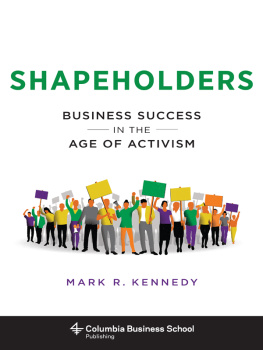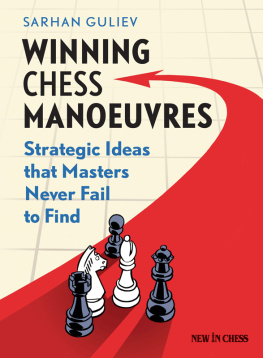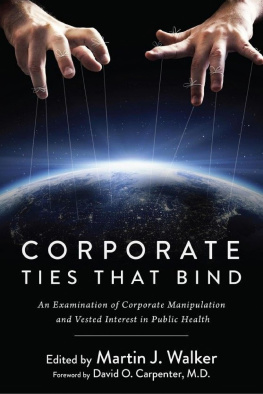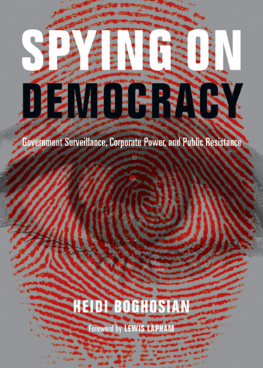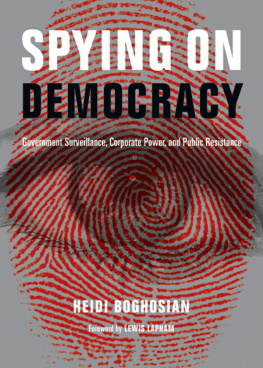This book is a joint project of
SpinWatch in the UK
www.spinwatch.org
and
Buro Jansen & Janssen in the Netherlands
www.burojansen.nl
First published 2012 by Pluto Press
345 Archway Road, London N6 5AA
www.plutobooks.com
Distributed in the United States of America exclusively by
Palgrave Macmillan, a division of St. Martins Press LLC,
175 Fifth Avenue, New York, NY 10010
Copyright Eveline Lubbers 2012
The right of Eveline Lubbers to be identified as the author of this work has been asserted by her in accordance with the Copyright, Designs and Patents Act 1988.
British Library Cataloguing in Publication Data
A catalogue record for this book is available from the British Library
ISBN 978 0 7453 3186 7 Hardback
ISBN 978 0 7453 3185 0 Paperback
ISBN 978 1 8496 4640 6 PDF eBook
ISBN 978 1 8496 4642 0 Kindle eBook
ISBN 978 1 8496 4641 3 EPUB eBook
Library of Congress Cataloging in Publication Data applied for
This book is printed on paper suitable for recycling and made from fully managed and sustained forest sources. Logging, pulping and manufacturing processes are expected to conform to the environmental standards of the country of origin.
10 9 8 7 6 5 4 3 2 1
Designed and produced for Pluto Press by Chase Publishing Services Ltd
Typeset from disk by Stanford DTP Services, Northampton, England
Simultaneously printed digitally by CPI Antony Rowe, Chippenham, UK and Edwards Bros in the United States of America
Thanks
Geert Lovink for guiding me through the wilderness, Buro Jansen & Janssen for all those years, David Miller and Will Dinan Dienke Hondius, Monique Verrijcke, Sheila ODonnell, Andy Rowell, Maja van der Velden, Rob Dover, Rick van Amersfoort and all the other friends who knew that I was going to get there. The ladies gym for their support and courage,
and of course, most of all, to Marq, my love, and Castor, Franka and Renzo, my kids, for making this possible and still loving me, and everybody at Omega and Villa Spijker for taking so much weight off my shoulders.
Preface
Corporate Spying Today
The exposure of Mark Kennedy as an infiltrator of activist groups made headlines in early 2011. Confronted by friends and fellow campaigners in the UK, Kennedy admitted to having been a spy for seven years. Using the name Mark Stone, he had embedded himself in the environmental movement, while widening his scope to protests against the summits of world leaders, anti-fascism campaigning and animal rights advocacy. His nickname was Flash because of the money he had available. He offered transport to set up climate camps and volunteered his climbing skills to add spectacular effects to, for instance, the occupation of power plants.
The Mark Kennedy case could have been a chapter in this book. It is an exemplary case, with the infiltrator providing transport and money, and sometimes crossing the thin line between facilitator and agent provocateur. It is an extraordinary case, not only for the span of the operation, the many years, and the amount of countries in Europe. The coverage in the press was huge, and as a result of public pressure, half a dozen official reviews are now under way.
The fact that he was a police spy would not have made a difference. On the contrary, the Kennedy case reveals the increasingly blurring boundaries between public and private policing and puts the grey area of corporate intelligence in the spotlight. The set of secret units Kennedy worked for was founded explicitly to satisfy the needs of companies targeted by activists. What is more, the companies involved such as electricity suppliers and airline companies also hire former police and intelligence staff to deal with security issues.
The fact that none of the official reviews into the Kennedy case investigates the aspects of corporate spying underlines the urgent need for a book putting the spotlight on similar secret manoeuvres in the dark.
BLURRING BOUNDARIES
The exposure of Mark Kennedy put the spotlight on secret police units making a profit from selling information, and showed that the police cooperate with private security services founded by former intelligence staff with long track records in monitoring activist groups.
As an undercover agent, Kennedy reported to a secret unit founded to deal with domestic extremism run by the Association of Chief Police Officers (ACPO). Its organization reflects the culture of secretiveness and the aversion to any public scrutiny of intelligence work. The unit Kennedy worked for was one of three. His was the National Public Order Intelligence Unit, created in 1999. The other two ACPO branches are the National Extremism Tactical Coordination Unit, set up in 2004, which advises thousands of companies on how to manage political campaigns, and the National Domestic Extremism Team, added in 2005, which pools intelligence gathered by investigations into protesters across the country. The units report to ACPOs Terrorism and Allied Matters Committee. Although it is responsible for some of the more sensitive national operations, ACPO is not a public body of any sort. It is a limited company, sharing its data with clients such as energy companies running power plants and airline companies involved in the expansion of airports and flights. In its 2008 statement of purpose, ACPO vowed to develop our business activities to ensure that the ACPO brand name is recognized globally as a mark of excellence in policing (ACPO, 2008). A Daily Mail investigation into its activities and assets revealed that ACPO was selling information from the Police National Computer for up to 70 even though it pays just 60p to access those details. It offers, among other services, so-called police certificates that reveal whether someone has a criminal record a service over which it has a monopoly. For a not-for profit, the company accounts show a significant annual surplus, still according to the Daily Mail, with 15.8 million in assets, including 9.2 million cash at bank and in hand (Lewis, 2009). In a response, the organization defended their activities, claiming that all funds to ACPO are employed in the interests of public safety and the police service (ACPO, 2009).
The national infrastructure for dealing with domestic extremism was set up with the backing of the Home Office in 1997 in an attempt to combat animal rights activists. It started in Huntingdon, as a section of Special Branch, the Animal Rights National Index (ARNI). At the time, the Home Office was getting really pressurized by big business pharmaceuticals in particular, and the banks about the extreme criminal behaviour of some people within the animal rights movement, according to Superintendent Steve Pearl, head of National Extremism unit. Later, the units incorporated ARNI altogether (Evans, Lewis and Taylor, 2009; for more background, see Mobbs, 2009). Since the criminal activity associated with these groups has receded, the secret units have expanded their remit to incorporate campaign groups across the political spectrum engaged in peaceful direct action. Special Branch colluded with private investigators hired by McDonalds to spy on activists in the 1990s, as Chapter 4 shows. More recently, according to Pearl, the focus shifted to the Climate Camp and Plane Stupid campaigns because environmental protesters had started shutting down airports and coal-fired power stations. A freedom of information request by the Liberal Democrats in 2009 revealed that the police and the Department of Business, Enterprise and Regulatory Reform (BERR) exchanged information with E.ON over the Climate Camp demonstrations at Kingsnorth power station. According to correspondence between civil servants and security officials at the company (seen by the


